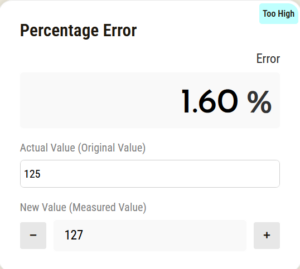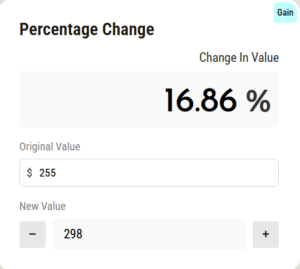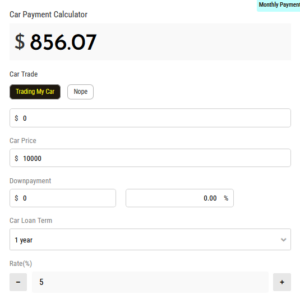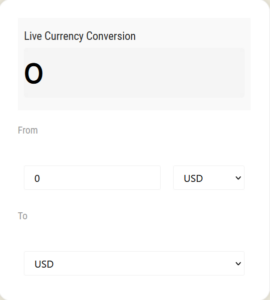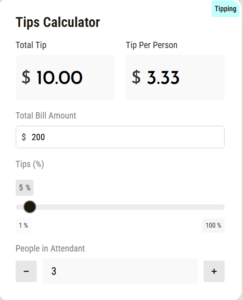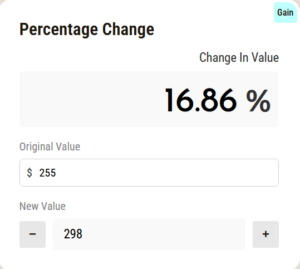Learn More About Car Payment Calculator
CalculatorCrave Car Loan Calculator is a valuable tool that can help you estimate your monthly car loan payments quickly and accurately. Simply enter the loan amount, interest rate, trading value, and loan term, and the calculator will provide you with an estimate of your monthly payments. This user-friendly calculator can help you plan your budget and make informed decisions when it comes to financing your next vehicle.
What is a car loan?
A car loan is a type of loan specifically used to finance the purchase of a vehicle. It is a common form of consumer lending, as many individuals do not have enough cash on hand to purchase a car outright. Car loans typically have fixed interest rates and monthly payments over a specified term, with the car itself serving as collateral for the loan.
Car loan benefits
One of the key benefits of a car loan is that it allows individuals to spread the cost of a vehicle over time, making it more affordable to purchase a car. Moreso, car loans can help individuals build credit history if payments are made on time.
Drawbacks
However, there are also potential drawbacks to taking out a car loan. Interest rates on car loans can vary widely depending on the borrower's credit score and other factors, potentially leading to higher overall costs. Additionally, if a borrower fails to make payments on a car loan, they risk having the car repossessed by the lender.
Research has shown that car loans are a significant factor in the overall debt burden of many individuals. According to data from the Federal Reserve, auto loans make up a large portion of total consumer debt in the United States. In fact, auto loan debt reached a record high of $1.37 trillion in the second quarter of 2021.
A study conducted by the Consumer Financial Protection Bureau found that the average car loan term has been increasing in recent years, with more borrowers opting for longer loan terms to lower monthly payments. While longer loan terms can make cars more affordable in the short term, they can also result in higher overall interest costs.
Car loans are a valuable financial tool for many individuals looking to purchase a vehicle. However, it is important for borrowers to carefully consider the terms of the loan and their ability to make payments in order to avoid financial strain in the long run.
Loan Terminology
Loan amount: This is the total amount of money borrowed from a lender to purchase a car. The loan amount can vary depending on the cost of the car, any down payment made, and any trade-in value.
Interest rate: This is the percentage of the loan amount that the borrower will have to pay to the lender as a fee for borrowing the money. The interest rate can vary depending on factors such as the borrower's credit score, the lender, and current market conditions.
Trading value: This is the value of a vehicle that is being traded in as part of the car purchase. The trading value can be used as a down payment or to reduce the loan amount, which can lower the monthly payments.
Loan term: This is the amount of time over which the borrower will be required to repay the loan. A longer loan term typically results in lower monthly payments, but may result in paying more in interest over the life of the loan. Shorter loan terms typically have higher monthly payments, but result in paying less interest over time.
Questions and Answers
1. Can I get a car loan with bad credit?
- Yes, you can still get a car loan with bad credit, but you may face higher interest rates and stricter approval criteria.
2. How much of a down payment do I need for a car loan?
- The typical down payment for a car loan is around 10-20% of the vehicle's purchase price, but some lenders may require more depending on your credit and financial situation.
3. How long can I finance a car loan for?
- Car loan terms typically range from 36 to 72 months, but some lenders may offer longer terms. Keep in mind that longer loan terms may result in higher total interest costs.
4. Can I refinance my car loan?
- Yes, you can refinance your car loan to potentially lower your monthly payments, interest rate, or both. Be sure to compare rates from multiple lenders to ensure you're getting the best deal.
5. What documents do I need to apply for a car loan?
- Generally, you'll need to provide proof of income, identification, proof of residency, and information about the vehicle you're purchasing. Lenders may also require additional documentation depending on your specific financial situation.


